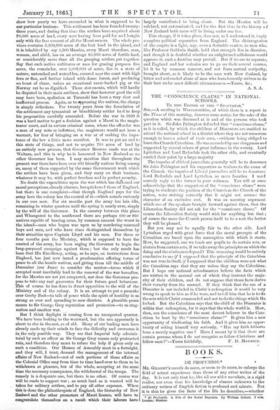THE "CONSCIENCE CLAUSE" IN NATIONAL SCHOOLS.
To THE EDITOR OP THE "SPECTATOR."
Srn,—A meeting in Worcestershire, of which there is a report in the Times of this morning, deserves some notice for the sake of the question which was discussed at it and of the persons who took part in it. Sir John Pakington defended that "conscience clause," as it is called, by which the children of Dissenters are enabled to attend the national school in a district where they are not numerous enough to have a school of their own, —without being obliged to learn the Church Catechism. He was seconded by one clergyman and supported by several others of great influence in the county. Lord Lyttelton and Lord Redesdale took the other side, and eventually carried their point by a large majority The impulse of clerical journalists generally will be to denounce Sir John Pakington and his supporters as traitors to the cause of the Church, the impulse of Liberal journalists will be to denounce Lord Redesdale and Lord Lyttelton as mere fanatics. I need scarcely reply to the former in your columns. You will at once acknowledge that the supporters of the "conscience clause" were trying to vindicate the position of the Church as the Church of the nation, were striving earnestly that it might not assume the character of an exclusive sect. It was an amusing argument which one of the speakers brought forward against them, that the Liberation Society did not ask for the "conscience clause." Of course the Liberation Society would wish for anything but that ; of course the more the Church proves itself to be a sect the better they will be pleased.
But you may not be equally fair to the other side. Lord Lyttelton urged with great force that the moral precepts of the Catechism are based upon the assumption with which it starts. How, he suggested, can we teach our pupils to do certain acts, or abstain from certain acts, if we take away the principles on which the doing and the abstinence depend? This reasoning would be entirely conclusive to me if I supposed that the principle of the Catechism was not true in itself, if I supposed that the children were not what the Catechism says that they are unless they say the Ciaechism. But I hope our national schoolmasters believe the facts which are written in the manual out of which they instruct the majo- rity of their children, and do not suppose that those facts derive their veracity from the manual. If they think that the son of a Dissenter is not included in Christ's redemption it would be very wrong to speak to him as if he were, and to tell him that he is to do the acts which Christ commanded and not to do the things which He forbad. But the Catechism says that the child of the Dissenter is within that redemption, for it says that the whole world is. How, then, can the conscience of the most devout believer in the Cate- chism be hurt by the "conscience clause ?" It gives him a new opportunity of vindicating his faith. And it gives him an oppor- tunity of asking himself very seriously, "Has my faith hitherto been a merely negative one 2 Have I meant by it that there are certain persons whom I do not recognize as fellow-Christians and
fellow-men ?"—Yours faithfully, F. D. 3Liunics.






























 Previous page
Previous page